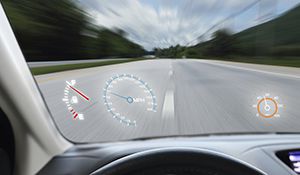 Technology has become an ever-growing presence in motor vehicles. Although some of it has decreased the chances of an auto accident, other forms are distracting drivers more than ever.
Technology has become an ever-growing presence in motor vehicles. Although some of it has decreased the chances of an auto accident, other forms are distracting drivers more than ever.
Head-up displays are becoming more common in premium-priced vehicles. A head-up display is an illuminated graphic that shows up on the vehicle’s windshield. The graphics could warn of a collision, show vehicle speed or even if a pedestrian is at risk of being hit. The displays are transparent so that a driver can look through them.
Unfortunately, there are no federal regulations on the use of head-up displays. The President of the National Safety Council in Chicago says that it is like the “Wild West” in terms of what types of technology is being put into vehicles without set standards.
A head-up display can warn of a collision, but it could also show a playlist or a text message, which can easily distract a driver.
The National Highway Traffic Safety Administration has said it has begun to research the issue. It expects to issue guidelines very soon.
Displays are currently available in Lexus, BMW, Cadillac, Mercedes and Audi models. The technology can be disabled by the driver. A J.D. Power study in August 2015 actually revealed that 33 percent of more than 4,000 new-car owners said they never use the displays in their vehicles. Survey respondents said they didn’t find the technology useful.
Other forms of new vehicle technology, such as infotainment systems, have also been found to be particularly distracting.
A study by the AAA Foundation for Traffic Safety revealed that the hands-free systems are still distracting as drivers are taking their eyes off the road to adjust settings or manually perform a task when the speech to text feature fails.
In Pennsylvania, the law prohibits drivers from using a cellphone, personal digital assistant or similar devices. If you have been hurt in a crash caused by a distracted driver, contact the car accident attorneys at Schmidt Kramer. We can determine your best legal options.
For a free case review, call (717) 888-8888 or fill out a contact form.

